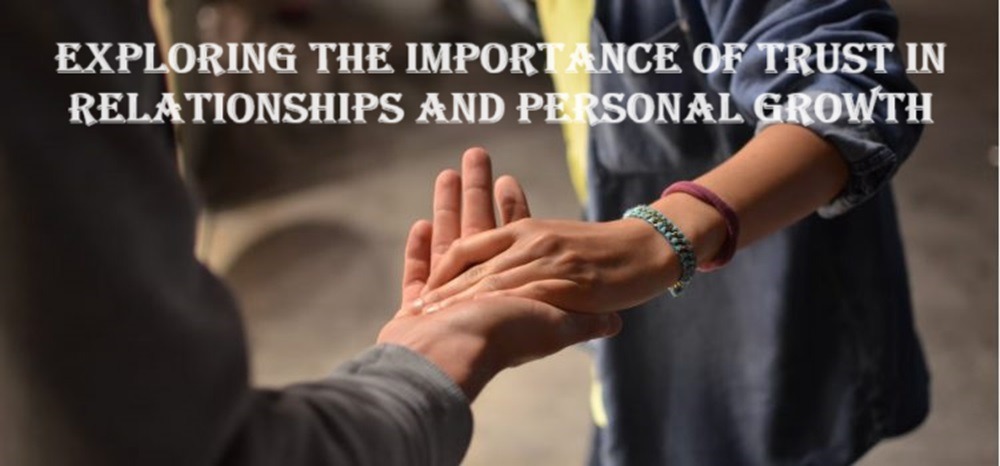Exploring the importance of trust in relationships and personal growth
In the realm of relationships, trust is the foundation upon which all other aspects are built. Without it, even the strongest bonds can crumble, leaving a trail of confusion and heartache. Trust is not just a good thing. It is an essential ingredient for a healthy, fulfilling relationship. Whether in romantic relationships, friendships or family bonds, trust plays an important role in ensuring stability, growth and happiness. This article describes the importance of trust in relationships, explores its various aspects and offers insights on how to develop and maintain it.
Why is trust important in relationships?
-
 Basis of stability
Basis of stability
Confidence provides a sense of security and stability. When partners trust each other, they feel safe and reassured that they can trust each other. This stability is essential for both emotional and mental well-being. Without trust, individuals are constantly worried about their partner’s actions and intentions, leading to stress and anxiety.
-
Enhances communication.
Open and honest communication is the hallmark of a healthy relationship. Trust fosters an environment where partners feel comfortable sharing their thoughts, feelings, and concerns without fear of judgment or retribution. This open line of communication helps resolve conflicts, understand each other better, and strengthen bonds.
-
Creates emotional intimacy.
Emotional intimacy is deepened through trust. When partners trust each other, they are more likely to open up and be vulnerable, sharing their deepest fears, dreams and desires. This level of intimacy can only be achieved when both parties feel secure in the knowledge that their partner will support and understand them.
-
Facilitates forgiveness and understanding.
Mistakes and misunderstandings are inevitable in any relationship. Trust allows partners to forgive each other and move past these hiccups. When there is trust, partners give each other the benefit of the doubt and work through problems together instead of harboring resentment.
-
Promotes independence and personal growth.
Trust in a relationship does not mean dependence. On the contrary, it encourages personal growth and independence. When partners trust each other, they feel secure enough to pursue their individual interests and goals, knowing that their relationship provides a supportive background. This mutual respect for each other’s autonomy strengthens the relationship.
The role of trust in romantic relationships
In romantic relationships, trust plays an even more important role. It’s the glue that holds everything together, from daily interactions to long-term commitments.
-
Confidence and determination
Commitment is the foundation of romantic relationships, and trust is an integral part of that commitment. Trust ensures that both partners are committed to the relationship and to each other. It fosters a sense of loyalty and loyalty, which is essential for long-term success.
-
Trust and jealousy
Jealousy can be a relationship killer. Trust acts as an antidote to jealousy, ensuring that both partners feel secure in their relationship. When trust exists, there is less room for jealousy and insecurity, allowing relationships to flourish.
Trust and Dispute Resolution
Conflicts are natural in any relationship, but how they are resolved can make or break a partnership. Trust plays an important role in conflict resolution, as it allows partners to approach disagreements with a willingness to understand and find common ground. Trust ensures that both parties believe in each other’s intentions and work toward a solution rather than winning an argument.
Building trust in relationships
Building and maintaining trust requires effort, consistency and sincerity. Here are some strategies for building trust in relationships:
-
Be honest and transparent.
Honesty is the foundation of trust. Being honest about your thoughts, feelings, and actions helps build a solid foundation of trust. Transparency in communication, even about difficult topics, shows that you respect and value your partner.
-
Keep promises and be reliable
Credibility is the key to building trust. Demonstrates adherence to promises and consistency in actions. When partners can trust each other, trust happens naturally.
-
Communicate openly.
Open communication is crucial to building trust. Discussing expectations, fears and concerns helps us understand each other better. Active listening and empathetic responses build trust and strengthen relationships.
-
Show respect and support.
Respecting each other’s boundaries, opinions and individuality builds trust. Providing support during difficult times shows that you are trustworthy and reliable.
-
Forgive and move on.
Holding grudges and dwelling on past mistakes can destroy trust. Forgiveness is necessary to move on. Admitting mistakes, sincerely apologizing, and working to improve help restore trust.
Signs of trust issues and how to deal with them
Identifying trust issues early can prevent long-term damage to the relationship. Here are some signs of trust issues and ways to deal with them:
-
Constant suspicion and jealousy
If a partner is constantly suspicious or jealous, this can indicate trust issues. Addressing these feelings through open communication and reassurance can help reduce insecurities.
-
Lack of communication
When partners avoid discussing important topics or withhold information, it can signal a lack of trust. Encouraging open and honest dialogue can help restore trust.
-
Reluctance to commit
A reluctance to commit or invest in a relationship can indicate underlying trust issues. Discussing these fears and working through them together can help build confidence.
-
Excessive protection or control
A partner being overly protective or controlling can stem from trust issues. Establishing boundaries and fostering mutual respect can alleviate these concerns.
Read More: Why You Lost Your Girlfriend (And How You Can Get Her Back)


 Basis of stability
Basis of stability










